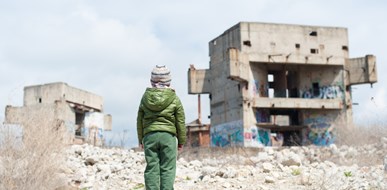[Interview] James Patrick Sexton: ‘There is a contrast between the dedication to prosecute war crimes and the practice’
Published 10 January 2023By Naomi Lamaury

@Shutterstock
Asser Institute researcher James Patrick Sexton examines the state obligation to investigate war crimes committed in multilateral settings during armed conflict in a recent journal article. He also works on several projects under the auspices of the Global Counterterrorism Forum (GCTF). ‘Informal and temporary military coalitions hinder accountability for war crimes.’ An interview.
Why did you choose to study international law?
“I originally studied Scots law at the University of Glasgow and never really had the intention to study international law. However, when I got the opportunity to spend a year studying at the University of Copenhagen on an Erasmus exchange, I was able to join very new and exciting courses, such as international migration law, which opened my eyes to the field of international law.
Then, when I returned to Glasgow to finish my undergraduate degree, I attended a lecture given by a former University of Glasgow law student: Professor Helen Duffy (Leiden University). She talked about her life and work, especially her time legally representing Abu Zubaydah, who was one of the first prisoners in the United States’ extraordinary rendition programme. (The U.S.’s practice of extraordinary rendition during its “war on terrorism” involved transferring individuals abroad for detention and interrogation without criminal charge(s) - ed). It was really inspiring to see this Scottish person, who had done the same law degree as me in Glasgow, living abroad and working on these crucial topics. I started applying for Master’s degrees in international law shortly afterwards.”
What is the main research topic you are working on at the Asser Institute?
“In the past few months, I have been working on a few different topics, mostly relating to armed conflict, international criminal law, and sanctions, all within the Asser Institute research strand: In the Public Interest: Accountability of the State and the Prosecution of Crimes. A long-term research project of mine, focusing on the legal obligation to investigate war crimes that are allegedly committed in multilateral settings, was very recently published as a journal article in The Military Law and the Law of War Review. The article addresses the difficulties of securing accountability within ad hoc military coalitions, which I define as temporary situations of cooperation between states that occur related to a specific armed conflict situation and then cease afterwards. So, when states X and Y cooperate in an armed conflict against state Z, for instance.”
Within my research strand I also work on projects under the auspices of the Global Counterterrorism Forum (GCTF), which is an informal group of states and the European Union (EU) that meets to create consensus on emerging issues in countering terrorism and violent extremism. I contribute to three GCTF projects: namely the Maritime Security and Terrorist Travel, Watchlisting, and Racially or Ethnically Motivated Violent Extremism (REMVE) Initiatives.
Why did you choose to focus specifically on ad hoc military coalitions in your recent article?
“It came from a hunch I had about cooperation between states in general; I noticed that the more informal and temporary interactions between states are, the less likely it is that accountability will be secured for the negative conduct that occurs. This made me start to think about situations in which states are collaborating during armed conflicts. For instance, in Yemen, several reports have identified the Saudi Arabian-led military coalition as allegedly responsible for numerous war crimes, without identifying which particular militaries carried out what conduct. I think that this focus on ad hoc informal coalitions is really interesting because once the coalition disappears it is gone forever, and, in most cases, so is accountability.
The other reason for choosing this topic is slightly more mundane: I simply could not find much research focusing on the relationship between ad hoc military coalitions and the obligation to investigate war crimes. I found a research gap and wanted to contribute.”
What do you hope to achieve with your research?
“Since working at the Asser Institute, I have reflected a lot on the legitimacy and impact of academic research. I really value academic research as something that is inherently valuable; however, since being based in The Hague with its various international courts, tribunals, policymakers and decision-makers, I also really strive to ensure that my research has a practical use.
With my article on ad hoc military cooperation, I want to show the contrast between, on the one hand, the international community being very dedicated to the investigation and prosecution of international crimes (and war crimes in particular) in the abstract, but, on the other hand, this idealism not being carried out in practice. While my research highlights that states do have these legal obligations, practical and political issues often stop the obligations from being implemented. I think that the example of ad hoc military coalitions brings this tension to the surface.”
You started as an intern at the Asser Institute and are now a junior researcher. What is the best thing about working here?
“On a professional level, a really unique thing about the Asser Institute is the exposure - at such an early stage - to important and interesting people. In my work on the various GCTF projects, for instance, I work with numerous kinds of state representatives. Also, through the Asser Institute's affiliation with the University of Amsterdam (UvA), I am able to attend and contribute to a research group called the ‘Law of Armed Conflict and Military Operations (LACMO)’ with some of the top academics on this topic, not only in the Netherlands, but I would say in the world…
On a personal level, I think that my colleagues are the best thing about the Asser Institute. I learn a lot from our conversations: about being a researcher, but also about being a nice and supportive colleague. I distinctly remember as an intern during my first meeting - when everyone was talking about their projects - thinking how crazy it was that this small group of people, based around the globe, are doing all these different things, about such interesting topics….”
What has been your proudest, or your most challenging moment as a researcher thus far?
“I think that my proudest - and at the same time most challenging - moment was when I presented the PhD proposal that I have been developing, on the relationship between international criminal law and sanctions, to all of my colleagues in our internal research lab series. I was very nervous because I have been attending these research labs for nearly two years and am always really impressed by the quality. But, in the end, my presentation went well, and I received a lot of constructive feedback that I have been able to incorporate as I now apply for PhD programmes.”
What advice do you have for students or young, early career academics that want to enter the field you're in now?
“Firstly, always think about your fellow students and interns as future colleagues rather than competitors. In my experience, this is rewarding on both a personal and a professional level. Firstly, the international legal sphere can sometimes be a bit overwhelming and lonely, so keeping these supportive relationships can definitely help. Also, after you have left your LL.M. or your internship, you will see these same people working on topics which often cross over with what you are working on, so it is also really useful to keep these relationships and collaborate. On a final note, I would say that if there are in-person events at your university, always go if you can find the time. You might not only get a free glass of wine at the reception afterwards (laughs), but I have found the world of international law to be very open and non-hierarchical.”
About James Patrick Sexton James Patrick Sexton is a junior researcher in public international law at the T.M.C. Asser Instituut within the research strand: 'In the Public Interest: Accountability of the State and the Prosecution of Crimes'. In this role, James contributes to several projects in the context of the Global Counterterrorism Forum (GCTF), namely the Maritime Security and Terrorist Travel, Watchlisting, and Racially or Ethnically Motivated Violent Extremism Initiatives.
James Patrick Sexton is a junior researcher in public international law at the T.M.C. Asser Instituut within the research strand: 'In the Public Interest: Accountability of the State and the Prosecution of Crimes'. In this role, James contributes to several projects in the context of the Global Counterterrorism Forum (GCTF), namely the Maritime Security and Terrorist Travel, Watchlisting, and Racially or Ethnically Motivated Violent Extremism Initiatives.
Read more
[New research paper] 'Magnitsky sanctions fail to serve human rights or security'
In a new paper, Asser Institute researchers James Patrick Sexton and Victoria Kerr conclude that so-called ‘Magnitsky sanctions regimes’ - in which governments target people suspected of human rights violations and abuses - are failing to achieve their aims.
[New publication] Military artificial intelligence and the principle of distinction: A state responsibility perspective
In a new article for the Israel Law Review (Cambridge University Press), researcher Magda Pacholska argues that the existing military AI technologies do not raise unique issues under the law of state responsibility.
[Research publication] Retaining human responsibility in the development and use of autonomous weapon systems
In a report for the Stockholm International Peace Research Institute (SIPRI), Marta Bo with Laura Bruun and Vincent Boulanin tackle how humans can be held responsible for violations of international humanitarian law involving autonomous weapons systems.

